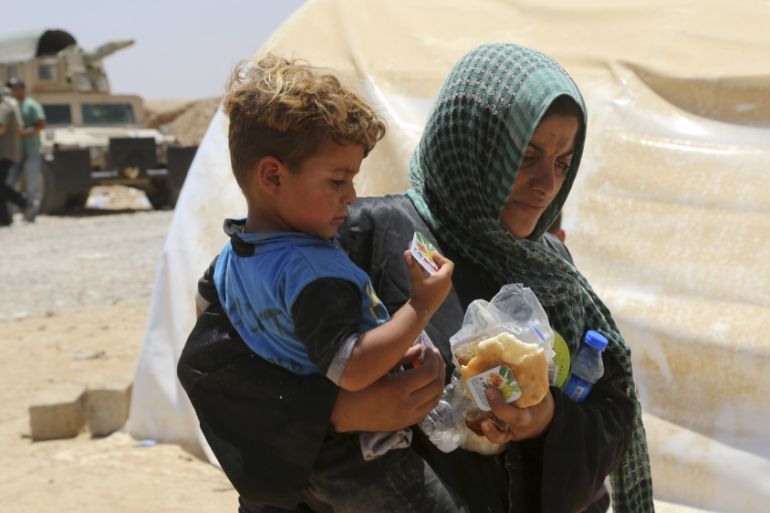Iraqi civilians may face abuse, torture in Mosul battle
Iraqi government must ensure appalling abuses against civilians do not happen in Mosul battle, report says.

Civilians caught in the crossfire of the military operation to retake the city of Mosul from the Islamic State of Iraq and the Levant (ISIL, also known as ISIS) may face abuse, execution and torture, Amnesty International has said.
The UK-based rights group released a critical 71-page report on Tuesday, detailing serious human rights violations when civilians previously attempted to escape areas controlled by ISIL, also known by its Arabic acronym, Daesh.
Keep reading
list of 4 items‘Mama we’re dying’: Only able to hear her kids in Gaza in their final days
Europe pledges to boost aid to Sudan on unwelcome war anniversary
Birth, death, escape: Three women’s struggle through Sudan’s war
Titled “Punished for Daesh’s Crimes”, the report is based on interviews with more than 470 individuals, from detainees to witnesses and relatives of those abused by ISIL, Iraqi government forces and other armed groups. Publishing the report only two days into the Mosul operation, Amnesty said it aims to raise alarm “about the risk of mass violations”.
“As the battle to retake Mosul gets underway, it is crucial that the Iraqi authorities take steps to ensure these appalling abuses do not happen again,” said Philip Luther, the group’s research and advocacy director for the region. “States supporting military efforts to combat IS in Iraq must demonstrate they will not continue to turn a blind eye to violations.”
The report found that under ISIL, Iraqi civilians, mainly minorities, face abuse in the form of deliberate attacks against them, mass killings, abductions, rape and sexual violence, among other human rights violations. Their mistreatment, however, does not end there, according to the report.
Even after fleeing ISIL, thousands of men and boys, mainly Sunni Arabs, were rounded up by Iraqi security forces or armed groups backed by the government, on suspicion of links to ISIL, the report says.
READ MORE: KRG – Mosul victory depends on ISIL fighters’ morale
Amnesty found that the Popular Mobilisation Units (PMU), a group of militias sponsored by the Iraqi government, was responsible for many of the abuses.
It is unclear what post-IS governance will look like in Mosul given the clashing agendas and competing forces that are at play.
“PMU militias and government forces have repeatedly perpetrated such crimes, targeting Sunni men and boys in revenge and sectarian attacks, as a sort of collective punishment for atrocities committed by IS against Shia and other communities,” Donatella Rovera, the senior crisis response adviser for Amnesty, told Al Jazeera.
“They have abducted thousands, most of whom remain ‘disappeared’, and have tortured and/or summarily executed many others.”
|
|
The PMU, comprised mostly of Shia militias but also include Sunnis and other sects, were officially designated part of the Iraqi armed forces in February 2016 after they took center stage in the fight against ISIL in 2014.
They have been repeatedly accused of the crimes detailed in the Amnesty report.
Despite Iraqi government promises to take precautions to protect the 1.5 million civilians stuck in the city, their fate remains unknown, especially as they try to flee. “We know ISIL prevents residents from leaving, and those who manage to flee do so at great personal risk,” said Rovera.
While the goal to liberate Mosul may be good for the long-term, Rovera believes that depending on the operation, “it is fair to say that combat will likely leave civilians at heightened risk”.
Some took to social media to express their solidarity and fear for the lives of the civilians.
ساعة الصفر بدءت لمعركة موصل، اللهم سلم المدنيين والابرياء من النيران التي لا ترحم
— Abdul-Hadi Al-Qafari (@Ali80iip) October 16, 2016
The tweet reads: “The battle for Mosul has begun, may God keep the civilians and innocents safe from the unrelenting attacks.”
#MosulOp is on.
Thoughts and prayers with our Armed Forces,Peshmerga,Coalition advisers,and of course civilians. #Mosul— Rasha Al Aqeedi (@RashaAlAqeedi) October 16, 2016
The United Nations said that up to one million could be forced to flee their homes, in addition to the half a million who fled when ISIL took over in 2014.
Good luck to all Iraqi, Kurdish & allied forces working to free Mosul from monstrous ISIS. Hope for quick fight & minimal harm to civilians
— Emile Hokayem اميل الحكيّم (@emile_hokayem) October 17, 2016
While the recapture of the city may be a step forward for its residents, many fear the struggle for control of the city that may ensue could put civilians in a vulnerable position once again. Mosul, the second largest city in Iraq, may become a microcosm of the security vacuum that was unleashed after the US invasion.
Fanar Haddad, analyst and author of the book Sectarianism in Iraq, says there is “a clear consensus that the difficulties in Mosul are more political than military”.
“It is unclear what post-IS governance will look like in Mosul given the clashing agendas and competing forces that are at play,” Haddad told Al Jazeera.
“The recapture of Mosul offers Iraq a chance to embark on a more politically sustainable path. However, and as ever, the odds are against Iraq: Given how much will be up for grabs, the redemptive potential of Mosul’s liberation is going to depend on the goodwill of an unwieldy number of actors both within Iraq and beyond.”